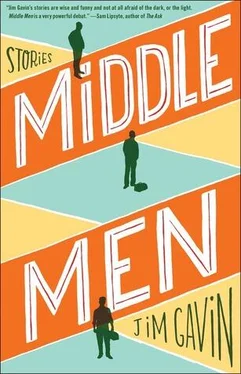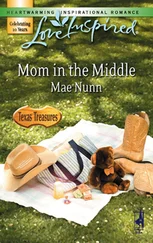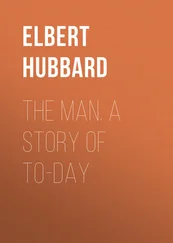Later, in bed, she thought of Bobby swimming the butterfly, the way his head would pop out of the water in perfect rhythms, and the way he would suck in the air, as if every breath was going to be his last.
It was a bright gray morning. Nora finished dressing and came out to the front room. Dave had already left. The down comforter she had given him was piled on the floor between the couch and coffee table. She folded it and left for work.
Jill was waiting for her when she got out of the elevator. She was her normal chipper self, having already forgotten the horrible way Nora had treated her yesterday. Nora found this deeply annoying; she had no patience for people who didn’t hold grudges.
“Are you okay?”
“I’m hung over.”
“There’s a funny-looking guy in your office.”
She recognized him from Beatles night at the pub. It was absurd seeing him now, in this context. He wore jeans and a ratty fleece, but the mop top remained, crowning his pudgy red face.
“I’m Alex,” he said. “Bobby’s asleep at my place.”
Somehow this made total sense. He drove her to his apartment. The car’s ashtray was overflowing and he used T-shirts for seat covers.
“He thinks the world of you,” he said.
“Why’d you take him back to your place?”
He looked at her as if he didn’t quite understand the question. “He was stuck out here.”
Back at the apartment, Alex warned her that Bobby had tried to shave his head. “Wonderful,” she said. Alex made tea while Nora went to check on Bobby. When she sat at the edge of the bed, he looked at her with groggy eyes. He smiled and ran a finger along one his bald streaks.
“How do I look?”
“Come on,” she said. “I’ll fix it.”
She brought him into the bathroom. He knelt in front of the sink, staring at himself, while she quietly shaved his head. He smelled like chlorine. When Nora finished, she sprayed a wad of cream into her hand and ran it through her hair.
“What are you doing?” said Bobby.
Nora didn’t say anything. She just handed him the razor.
As a boy, Matt Costello often wondered what his dad did when he left the house in the morning. The old man was in sales, he knew that, and from the brochures and catalogues stacked in the garage, he knew it had something to do with toilets. This always seemed like a joke to Matt — toilets! — and he didn’t understand why anyone would choose to go into this line of work. Years later, while half-assing his way through college and trying to decide what to do with his life, he finally asked his dad how he got into the plumbing industry. The old man, with his usual modesty and good humor, explained that when he returned from Vietnam in 1969, his only goal in life was to work someplace with air-conditioning. To that end he answered a classified and got hired to work the order desk at a toilet warehouse somewhere in the industrial corridors of South Los Angeles. This decision led to a lifelong career as a plumbing salesman, a twist of fate that seemed funny to Matt, or did for a while, anyway, as he wasted away his twenties bartending, coaching soccer at his old high school, and not quite finishing his university education.
Then his mom got sick. Matt quit all his jobs, moved home to Anaheim, and spent the next year helping to take care of her while she endured chemotherapy. Several of his closest friends had lost their moms to cancer, so he knew the drill. This happened to everybody sooner or later, and he marveled at the quiet and dignified way his friends had moved on with their lives. He looked forward to doing the same, earning his credentials as a stoic and joining their club, but when his mom died, he failed to live up to their example. His mom was a fierce, deadpan woman, and deeply practical. Before the cancer got to her brain, she carefully planned her own funeral. She wanted “On Eagle’s Wings” for the recessional hymn and she dispatched her daughters to JCPenney’s to pick out a dress for the coffin. “Nothing too fancy,” she said.
After she died, Matt, for his pain and loss, felt entitled to many rewards. He secretly anticipated, in no particular order, a moment of spiritual transcendence, the touch of a beautiful and understanding woman, and some kind of financial windfall. Instead, at thirty, he was broke and living at home. His sisters, the true stoics in the family, had both moved out and resumed their careers. The house was empty in the afternoons, so he sat by the pool and watched the water turn green. At night, when his dad went to bed, he’d load up on his mom’s leftover Vicodin and watch The Office over and over. That bit in the Christmas special, when Tim says he’ll get a drink with David Brent, crushed him every time.
Enough was enough. A month after the funeral, his dad talked to his boss, Jack Isahakian, of Ajax Plumbing Sales, and Jack offered Matt a job selling toilets. With no other prospects, he accepted. Now, a year later, deeply aware of his own vanity and foolishness, he was sitting through another sales meeting at the Ajax warehouse in Compton.
• • •
Larry Rembert, the factory guy from Brentford, paced back and forth in the dusty light of the wood-paneled conference room. Ajax repped Brentford toilets throughout SoCal. It was one of their glamour lines. Larry, a short, paunchy black man in his fifties, finished his third can of Budweiser and held up the new Brentford catalogue. He turned to a picture of the new vitreous china siphon jet urinals.
“The flushing velocity on these things,” he said, “is fucking breathtaking.”
Matt noticed all the veteran outside salesmen taking notes. Realizing he didn’t have a pen, he sank down in his seat. At the front of the room, his father, Marty Costello, the top outside salesman at Ajax, tapped his fingers on his knees, jonesing for a cigarette.
Larry assured Jack that the improved pricing and rebates would strengthen their position with commercial contractors. On the residential side, he hyped the Ultima 900, an elongated vacuum-assist two-piece with a newly designed anti-siphon ballcock, and apologized, once again, for the old ballcock, which was recalled this past spring, causing chaos for new-work plumbers throughout Los Angeles, Orange County, and the Inland Empire.
Afterward, Larry repaired to the Panorama Lounge of the Holiday Inn in Long Beach, where, amid moody neon tube lights and smooth jazz renditions of contemporary pop hits, he bought drinks for all of Ajax’s outside salesmen and for a group of aerospace engineers who had been laid off earlier in the afternoon. He rehashed key points from his recent speech at the Association of Independent Manufacturers’ spring conference in Reno, and spoke with conviction on a variety of topics. He had his doubts about the war in Iraq (“Rumsfeld’s a fag”), he worried about the state of the NBA (“all these Serbian dudes look like vampires”), and he loved the new season of 24 (“a total mind-fuck”).
At some point in the evening, as Larry staggered around the bar, trying to make a case for the existence of the chupacabra (“I’ve seen some things , man”), Jack steered him toward Matt.
“This is Marty’s kid,” said Jack, standing between them. “He’s our new bottom-feeder. Maybe you could ride with him tomorrow. Help him out.”
“You bet,” said Larry, and then, leaning in close to Jack, he whispered, “I’ll take him to the luau.”
For some reason, the word “luau” distressed Matt. He thought it might be code for a sadistic initiation rite known only to toilet salesmen. There was a lot of lingo in the industry and still, after a year, he barely understood what anyone was talking about. He wanted to ask for specifics, but Larry and Jack were busy ordering another round and his dad had already gone home.
Читать дальше












